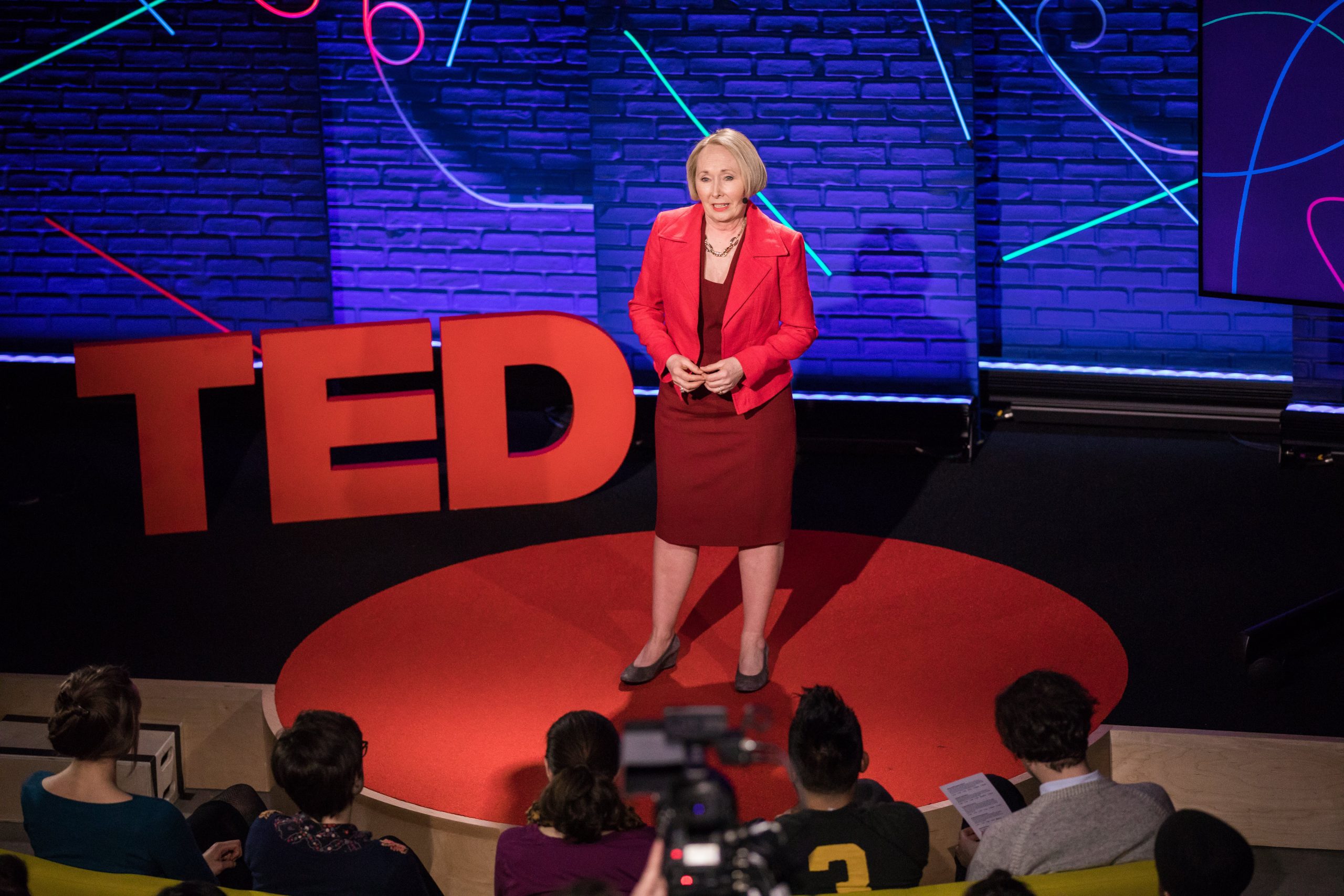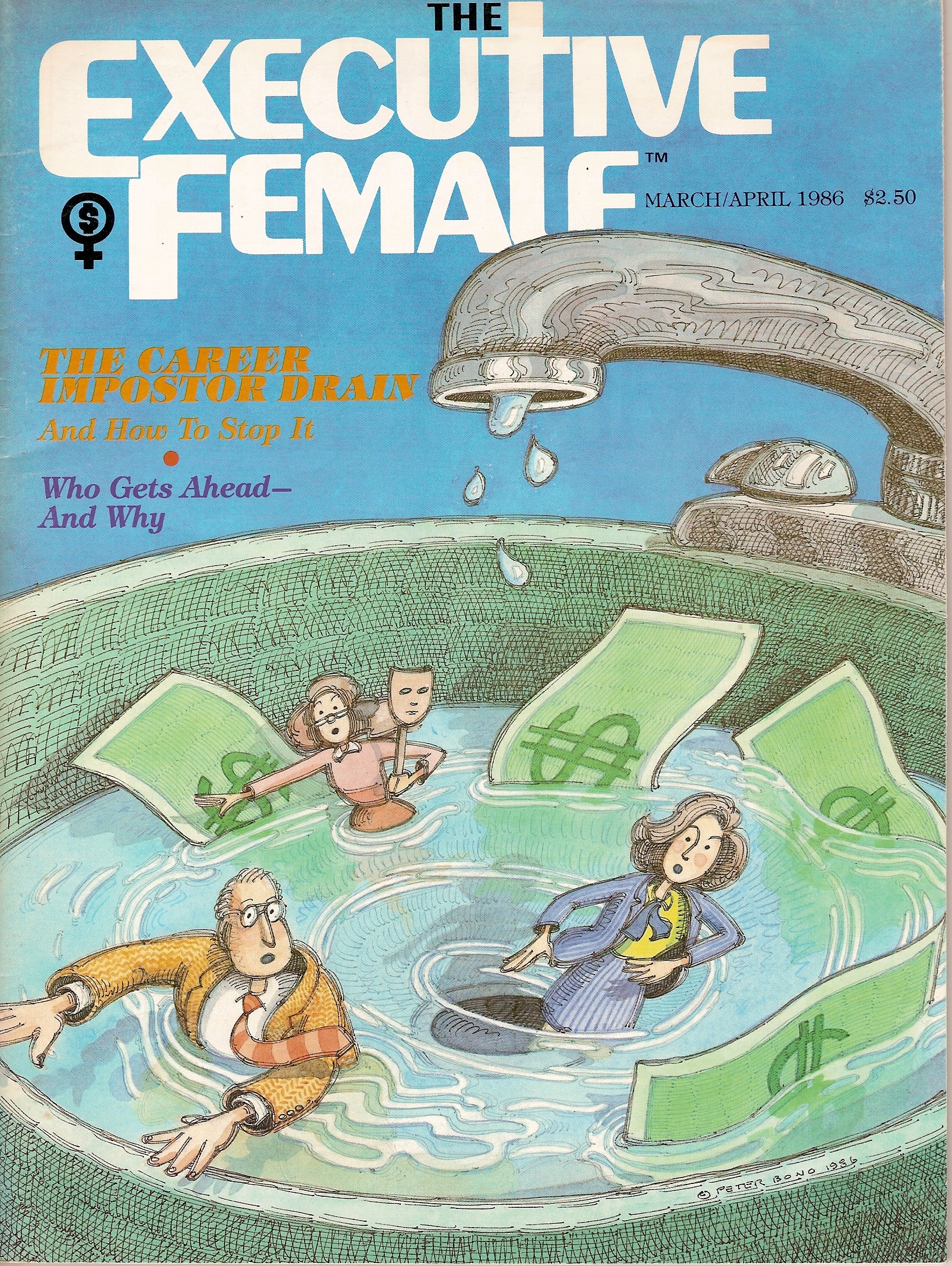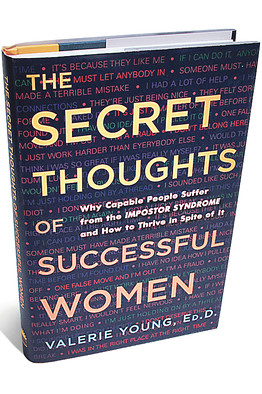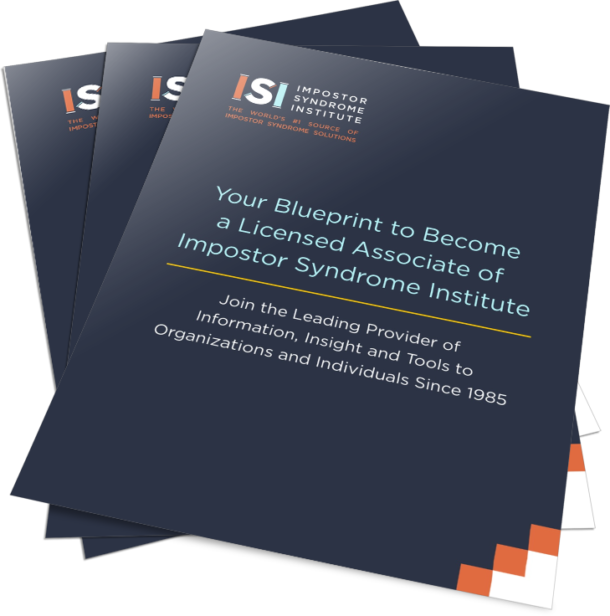Impostor Syndrome Institute
Impostor Syndrome Institute (ISI) is the official provider of information, insight and tools to organizations and individuals since 1985.
ISI was co-founded by Dr. Valerie Young, widely recognized as the foremost expert on impostor syndrome, and Carolyn Herfurth, a leading business growth strategist specializing in working with speakers, thought leaders and service-based business owners.
Our Mission is Simple: Stamp Out Impostor Syndrome
Rethinking Impostor Syndrome™ (RIS) is the name of our proven educational solution that has been delivered to over 500,000 people around the world.
Our strong commitment to diversity, inclusion, and equity in all forms is woven throughout all of our solutions.
Keynote
The program can be delivered as a one-hour presentation and/or a longer interactive workshop. What’s more, it can be delivered both virtually and in-person.
Hire a Rethinking Impostor Syndrome licensed speaker.
Licensing for Speakers and Workshop Leaders
Become a part of our global network to stamp out impostor syndrome and add a long-term revenue stream to your coaching, speaking or workshop facilitation business as a specialist on this high-demand topic.
Facilitator Training for Organizations, Higher Education, and Associations
abcdefghijk
Certification for Coaches
abcdefghijk
Rethinking Impostor Syndrome™
Rethinking Impostor Syndrome (RIS) is the name of our proven educational solution that has been delivered to over 500,000 people around the world since 1985.
RIS is called a solution, not just for its powerful core messages, but also because the approach is:
Diversity and inclusion driven
Adaptable to a wide range of audiences, industries, sectors, genders, and professions
Flexible enough to be expanded or contracted
Easily integrates into existing programs
Filled with practical insight, information and tools
Immediately usable by individuals and organizations
Point of View
You can’t share your way out of impostor syndrome.
The only way to stop feeling like an impostor is to stop thinking like an impostor.
Everyone loses when bright people play small.
Rethinking Impostor Syndrome™ Delivers 5 Core Messages

CORE MESSAGES
THE NEED
Impostor syndrome isn’t just an “interesting self-help topic” – it’s a bottom line issue. Impostor-related thoughts and feelings lead to unproductive behaviours which are costly to individuals and their organization.
An estimated 70 percent of achievers – men and women – have experienced impostor syndrome. Discovering a name for these common feelings is the first step.
You’re
Not Alone
NORMALIZE
Impostor syndrome has been over-psychologized. In addition to family messages, there are situational, occupational, societal, and organizational sources of impostor feelings. Seeing our individual experience in a broader context helps to normalize and mitigate it.
A sense of belonging fosters confidence. Societal stereotypes about competence based on gender, race, age, language, class, and/or dis/ability make some groups especially susceptible to impostor syndrome.
Diversity
Matters
REFRAME
FACT: Feelings are the last to change. The only ay to stop feeling like an impostor is to stop thinking like an impostor. Fortunately this new thinking can be learned – and supported on an organizational level.
THE 5 TYPES OF IMPOSTORS
People who feel like impostors hold themselves. to unrealistic, unsustainable standards of competence. After polling hundreds of thousands of people from all walks of life and at all phases of their careers – five different types emerged – each with its own unique focus:
THE PERFECTIONIST
The Perfectionist’s primary focus is on “how” something is done. This includes how the work is conducted and how it turns out. One minor flaaw in an otherwise stellar performance or 99 out of 100 equals failure and thus shame.
THE EXPERT
The Expert is the knowledge version of the Perfectionist. Here, the primary concern is on “what” and “how much” you know or can do. Because you expect to know everything, even a minor lack of knowledge denotes failure and shame.
THE SOLOIST
The Soloist cares mostly about “who” completes the task. To make it on the achievement list, it has to be you and you alone. Becuase you think you need to do and figure out everything on your own, needing help is a sign of failure that evokes shame.
THE NATURAL GENIUS
The Natural Genius also cares about “how” and “when” accomplishments happen. But for you, competence is measured in terms of ease and speed. The face that you have to struggle to master a subject or skill or that you’re not able to bang out your masterpiece on the first try equals failure which evokes shame.
THE SUPERHUMAN
The SuperHuman measures competence based on “how many” roes you can both juggle and excel in. Falling short in any role – as a parent, partner, on the home-front, friend, volunteer – all evoke shame because you feel you should be able to handle it all – perfectly and easily.
history of commitment to diversity, equity & INclusion
Impostor Syndrome Institute is built on a commitment to diversity, inclusion, and equity that began in 1976 — long before this language even existed
Valerie’s content left our employees feeling energized and hopeful for confronting the symptoms of imposter syndrome in real time. Furthermore, she helped our employees explore the root causes of impostor syndrome so that they can develop organizational solutions to environmental conditions that produce it.
— Tarikh Campbell, Workplace Inclusion Manager, MICROSOFT
Thank you for your excellent talk at the STEM Men of Color Symposium. Feedback has been unanimously positive and the symposium would not have been as strong without your contribution.”
— Jami P. Joyner, Director of Inclusive Student Excellence, Diversity Programs in Engineering, CORNELL UNIVERSITY
Over 600 people registered for the Webinar and based on attendee evaluations ranks as one of our most highly rated presentations.
— Peter M. Finn Director of Learning & Development, SOCIETY OF WOMEN ENGINEERS
I strongly recommend the workshop for any leader at any level. I found the workshop to be extremely useful in my position as Dean and Valerie’s coverage of the topic to be very accessible, bolstered with data and excellent examples, and very practical. I left with a number of actions I will take immediately to begin to help those with this syndrome, and with a commitment to make long-lasting changes that will lessen the effects of this syndrome on students, faculty and staff in the College of Engineering.
— Jim Garrett Jr. Dean, College of Engineering CARNEGIE MELLON
Your European Women’s Leadership conference evaluations were overwhelmingly positive with most attendees rating it and you as “excellent.” The over 20 countries and virtually as many languages represented confirms that impostor feelings are truly universal. Thanks again for a great job.
— Jane Gibbon, Senior Director, HR McDONALD’S EUROPE
Your absorbing presentation not only enriched but also helped to renew the commitment of faculty leaders – from deans, chairs, senate members, equity advisors, to graduate mentors – to build and sustain a culture of inclusive excellence at UCI.
— Douglas M. Haynes, Ph.D. Associate Professor and Associate Vice Provost for Equity and Diversity UNIVERSITY OF CALIFORNIA, IRVINE
Our History in DE&I
From its inception in the early 1980s Rethinking Impostor Syndrome™ has widened the lens to address the larger intersection between impostor syndrome and what is today known as DE&I.
The impetus to work in the newly emerging field of social issues education began in 1975 when Impostor Syndrome Institute co-founder Valerie Young took an undergraduate course on racism led by Judith Katz, author of White Awareness: A Handbook for Anti-Racism Training.
Eager to follow in Judith’s footsteps, Valerie applied to the masters/doctoral program in the College of Education at the University of Massachusetts, Amherst. In addition to her studies, she served as a workshop designer, facilitator, and Founding Coordinator of the Social Justice Education (SJE) program.
A forerunner of today’s diversity and inclusion training, SJE’s mission was to create educational methodology to raise awareness of the individual, cultural and institutional dynamics of racism, sexism, anti-Semitism, ableism, classism, heterosexism/homophobia. It was established by Valerie’s faculty advisor and mentor, Dr. Bailey Jackson who is known for his groundbreaking work on the dynamics of oppression and black identity development theory.
Valerie’s interest in impostor syndrome was sparked by a 1978 paper by psychology professor Pauline Clance and clinical psychologist Suzanne Imes. In it they described their shared experience counseling women who expressed a persistent pattern of dismissing evidence of accomplishments and abilities and fear of being discovered to be an “impostor.”
“Everyone loses when bright people play small”
Today Rethinking Impostor Syndrome™ includes, but goes beyond, gender to address the systemic reasons that can lead people of color, first-generation students and professionals, early career or older employees, individuals who study or work in a different country/culture, and people with disabilities to be especially prone to impostor feelings.
Furthermore, this intersection between impostor syndrome and DE&I is presented in a way that ensures everyone feels seen regardless of social group membership.
This in depth understanding of situational, occupational, societal, and organizational sources of impostor syndrome coupled with a commitment to DE&I that began over four decades ago has made Rethinking Impostor Syndrome™ the clear choice of scores of DE&I professionals and corporate ERGs as well as the US Department of Commerce’s First Generation Professionals conference, MIT’s First Generation Student program, Cornell University’s Men of Color in STEM Symposium, and dozens of university and association initiatives aimed at attracting, retaining, and advancing women and people of color in STEM.
Dr. Valerie Young

“Valerie Young is to impostor syndrome what Brene Brown is to vulnerability.”
-MARK LERUSTE, FOUNDER of THE UNCONVENTIONALISTS
SPEAKER | AUTHOR | MAPMAKER
Since 1985 internationally-recognized expert on impostor syndrome and co-founder of Impostor Syndrome Institute, Dr. Valerie Young has delivered her Rethinking Impostor Syndrome program to hundreds of major corporations and universities around the world.
Her award-winning book “The Secret Thoughts of Successful Women: Why Capable People Suffer from Impostor Syndrome and How to Thrive in Spite of It” (Crown/Random House) is in six languages.
MAPMAKER
As the world’s foremost expert, Valerie Young is uniquely qualified to help your organization address Impostor Syndrome:
Relevant Research in the Field
Valerie earned her doctoral degree in education from the University of Massachusetts in Amherst in 1985. Her research examined internal and societal barriers to women’s achievement that might lead to impostor feelings.
Since then Valerie’s findings come from her in-the-trenches experience delivering talks and workshops to over half a million people in a wide range of sectors and occupations.
Proven Champion of Diversity, Equity & Inclusion
She has long recognized the relationship between impostor syndrome and social expectations and realities related to gender, race, age, class, and ability.
From 1979 to 1984 Valerie also served as the founding coordinator of the UMass Amherst College of Education’s Social Justice Education (SJE) program. An early forerunner to what is now known as diversity training, the mission of SJE was to understand the dynamics of oppression and to design and deliver workshops to raise awareness of individual, cultural, and institutional sexism, racism, anti-semitism, classism, homophobia/heterosexism, and ablism.
Subjects of her doctoral research were professional women, a majority women of color. Notably, the core solutions from these original findings have since proved useful for anyone experiencing impostor feelings.
Extensive Experience Understanding Needs of Organizations
Psychology professor Pauline Clance and clinical psychologist Suzanne Imes’s pioneering study on the impostor phenomenon came out in 1978. Subsequent research largely looked at it in purely psychological terms.
However, Valerie has long recognized both the organizational causes and costs of impostor syndrome – something she addressed in her 1986 cover article in Executive Female magazine.

Dr. Young is a mapmaker. I am recommending her book to all my clients and students who suffer with impostor feelings.
– Suzanne Imes, Co-Discoverer of Impostor Phenomenon
AUTHOR
Valerie’s award-winning book consistently earns a spot on Amazon’s Top 100 in Women & Business list. And even after a decade in print, sales of “The Secret Thoughts of Successful Women” grow year over year.
To learn more about the book, click here.

SPEAKER
As the world’s foremost expert, Valerie Young is uniquely qualified to help you and your audience address Impostor Syndrome.
HIRE VALERIE
Watch the talk Valerie delivered about impostor syndrome when she was invited to TED headquarters in New York city.
HIRE VALERIE
MEDIA
Beginning in 1985 with the coverage of her workshop by The Boston Globe through to the advice featured in The Wall Street Journal’s 2020 article, “Does COVID Have You Feeling Like a Fraud at Work?” Valerie continues to be a sought-after expert by both popular and business media around the world.
She continues to be a sought-after expert by both popular and business media around the world.

Valerie’s impostor story
“Oh my God,” I thought, “she’s talking about me!”
Read Valerie’s full impostor story here.


